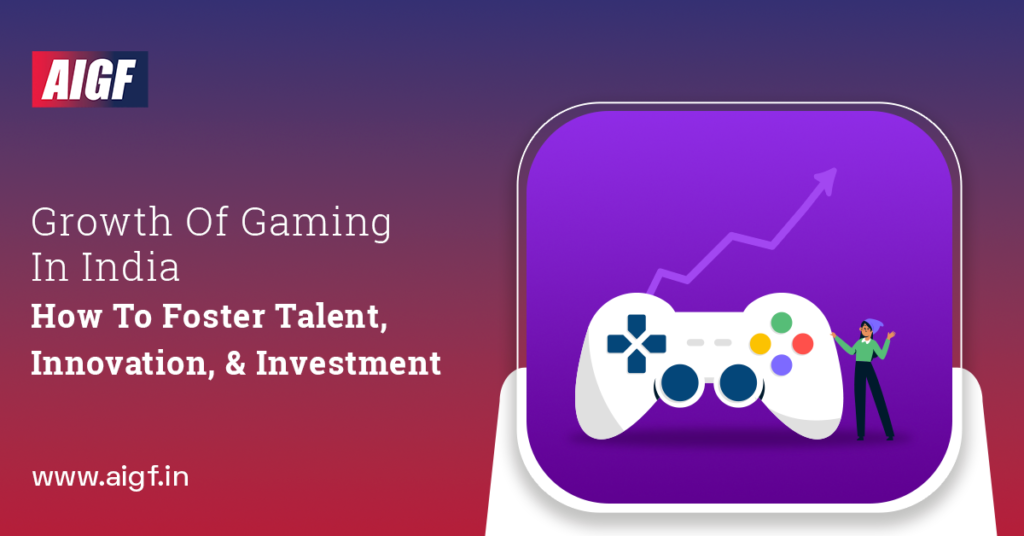The accessibility of affordable internet and smartphones has fueled India’s gaming sector’s remarkable development. Being on the cusp of outstanding growth, the gaming sector is supposed to develop by 20–30% by fiscal 2023 and arrive at Rs 380 billion by 2026. To completely understand the capability of the gaming industry, experts require a controlled environment that cultivates talent, innovation, and investment.
Growth Of Gaming In India: How To Foster Talent, Innovation, And Investment
The accessibility of affordable internet and smartphones has fueled India’s gaming sector’s remarkable development. Over time, gaming has evolved from a source of entertainment to a mainstream industry. Being on the cusp of outstanding growth, the gaming sector is supposed to develop by 20–30% by fiscal 2023 and arrive at Rs 380 billion by 2026.
To completely understand the capability of the gaming industry, experts require a controlled environment that cultivates talent, innovation, and investment.
Policy for startups
“Gaming which is part of the audio-visual gaming and animation (AVGC) industry in India, can drive significant economic and cultural growth in the country and beyond. Creating favorable policies that support startups and promote collaborations will be beneficial to aid the entire ecosystem leading to the evolution of the sector,” says Ajay Pratap Singh, CEO, Sportskeeda.
Regardless of its fundamental development in recent years, the gaming industry is still in its early stages and offers huge potential for development. Observing the gaming sector and making India a worldwide center of gaming, the government has worked quickly to help the sector’s development.
The government has named the Ministry of Electronics and Information Technology (MeitY) as the nodal ministry for online gaming, which has delivered a draft set of rules for the online gaming sector, with an intent to fill the regulatory lacunae.
The Finance Ministry, as well, brought in amendments to the Income Tax Act, of 1961, perceiving online gaming as a unique technology-driven entertainment sector and highlighting its distinction from games of chance like lotteries, pay-to-play, and so on. “There continues to be an impending decision on the indirect taxation mechanism for the industry, which is yet to be arrived at, which would be the last major hurdle from a policy perspective for the industry before it can find solid footing to grow on,” says, Vikrant Goyal, Chief Human Resource Officer, Games24x7, one of the unicorns of the gaming industry.
“Aside from the regulatory challenges, which are at various stages of resolution, the online gaming sector still has a long journey ahead in its growth as a mainstream industry. On the one hand, there is huge scope for mainstream adoption, as we have seen from the rapid growth in the number of online gamers, which stands at just over half a billion as per 2022 estimates. This needs to be supported with technology infrastructure, which is still being developed, including 5G adoption, internet penetration, etc.,” adds Goyal.
Challenges of the gaming sector
There are a couple of difficulties facing the developing gaming sector that require prompt attention to fully capitalize on its prospects. As the demand grows, there is an expanding pipeline of possibilities for skilled talent to fuel development and innovation.
“With the government now recognizing esports as a profession, I foresee, the demand for high-quality content from Indian studios will see a rise, further cementing the position of this industry. However, the shortage of skilled talent, dated infrastructure, and limited access to funding seem like major roadblocks to rapid growth. To tackle this, it is imperative to address these challenges and advocate for the necessary reforms in training and education, the modernization of infrastructure, and increased access to funding. This will help create a more conducive environment for AVCG companies and ensure the industry’s sustainable growth for years to come,” explains Singh.
Finding the right talent with a lot of gaming experience is one of the biggest challenges. “Many of our resources have been groomed into their roles and have grown with the company. We have also been able to tap into the broader market, cherry-picking high-end experienced talent from different verticals as well as creating a pipeline through campus hiring initiatives,” says Goyal.
What led to the growth
The pandemic brought about an exceptional shift toward digital entertainment, prompting a remarkable development of this section.
Moreover, the execution of 5G technology and the rising penetration of networks covering the nation is further fueling the development of the digital entertainment industry. Furthermore, the ascent of technologies like AR, VR, and ML has extended the use of gamification and digitalization in traditional sectors such as education, fintech, and several other industries, making way for new opportunities and development.
It will be fundamental for associations to continue to improve and invest in new technologies to satisfy the changing needs of consumers to remain significant. The digital entertainment industry is ready for significantly more prominent development and progress before very long, and the people who stay versatile will be the ones who receive the benefits.
Jobs in the sector
The online gaming industry alluded to as a “sunrise” industry, is supposed to create 1 lakh jobs by this year. A fast extension because of the increase in user base and investment opportunities will bring about plenty of job opportunities, not just for people who are passionate about gaming, but also for addition in technology, design, marketing, and data science.
“With the emergence of rapid digitization and gamification, technologies such as Web3, cloud services, fintech, the metaverse, and blockchain gaming have opened a new path for creating more valuable and creative job opportunities. Some of the major areas where new jobs are expected to be created include data science, product design, category marketing, UI/UX, etc.,” adds Goyal.
Gaming Education
The dramatic development of the AVGC industry has brought about increased demand for skilled experts in the industry. “Academic institutions are taking note of this demand and are beginning to develop support ecosystems to nurture and develop talent for the AVGC industry,” says Akshay Marwah, Co-Founder, AAFT Online, led by the promoters of AAFT University.
As per Marwah, academic institutions are observing this demand and are starting to develop support ecosystems to sustain and develop talent for the AVGC business.
The gaming sector is expected to employ over 20 lakh individuals in the following decade, with the sector likewise expected to witness a development pace of 16–17%. “These factors are why experts have called for collaborations in academia, co-production, technology, policy, and research. It is predicted that it will not only leverage the existing industry expertise but also help boost domestic capacities and develop the opportunity landscape,” says Marwah.
Credit: People Matters











Comments
Comments are closed.